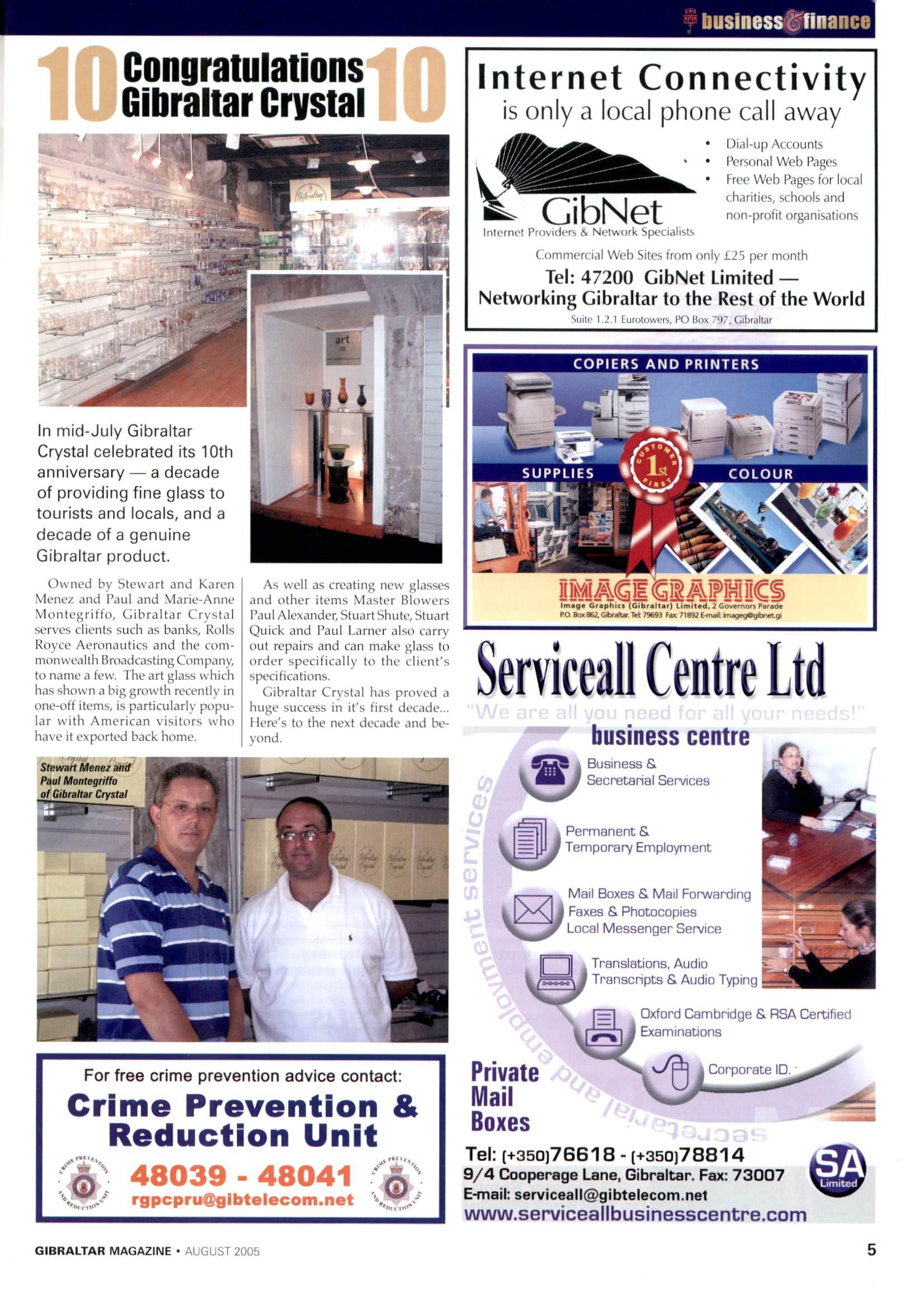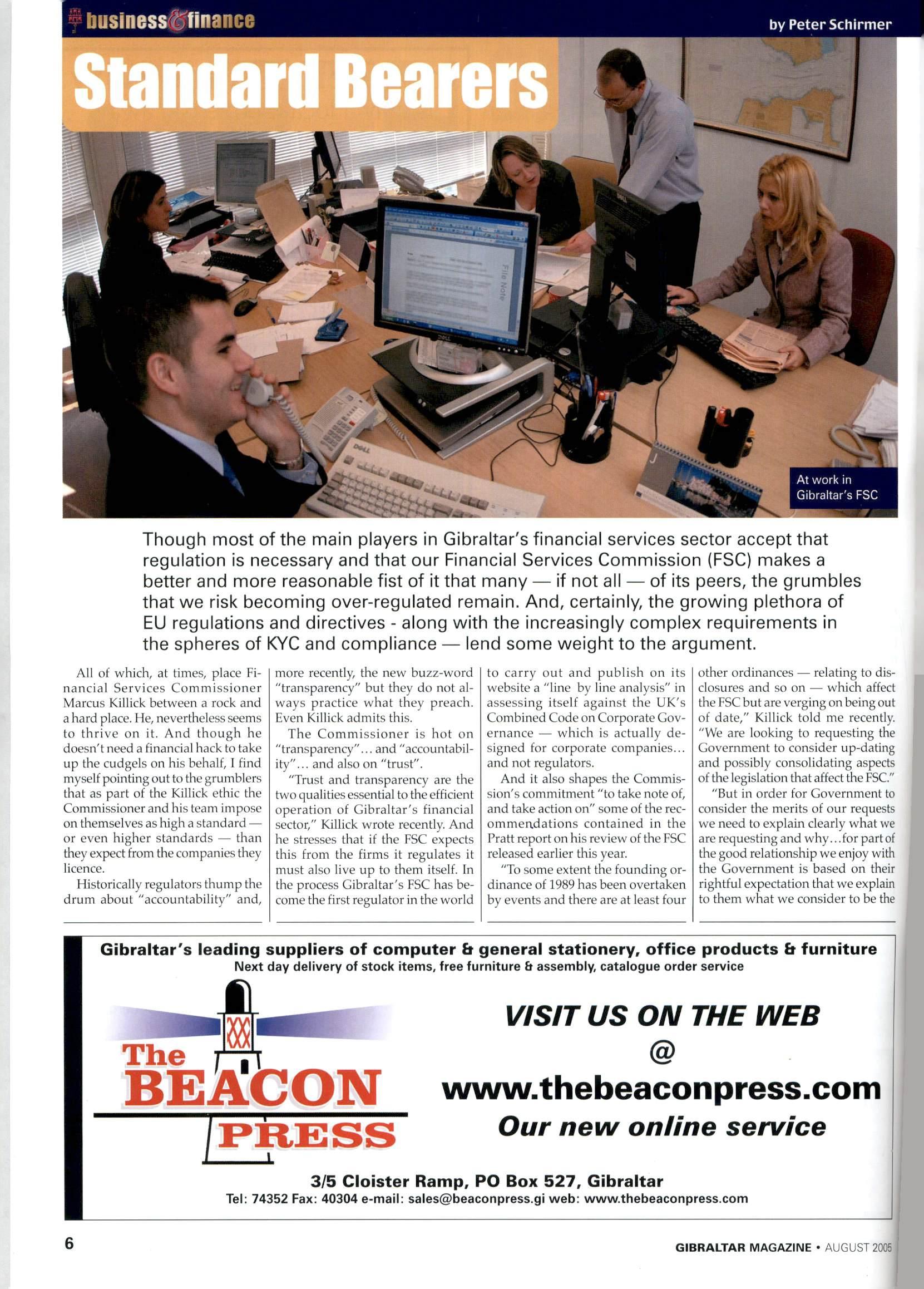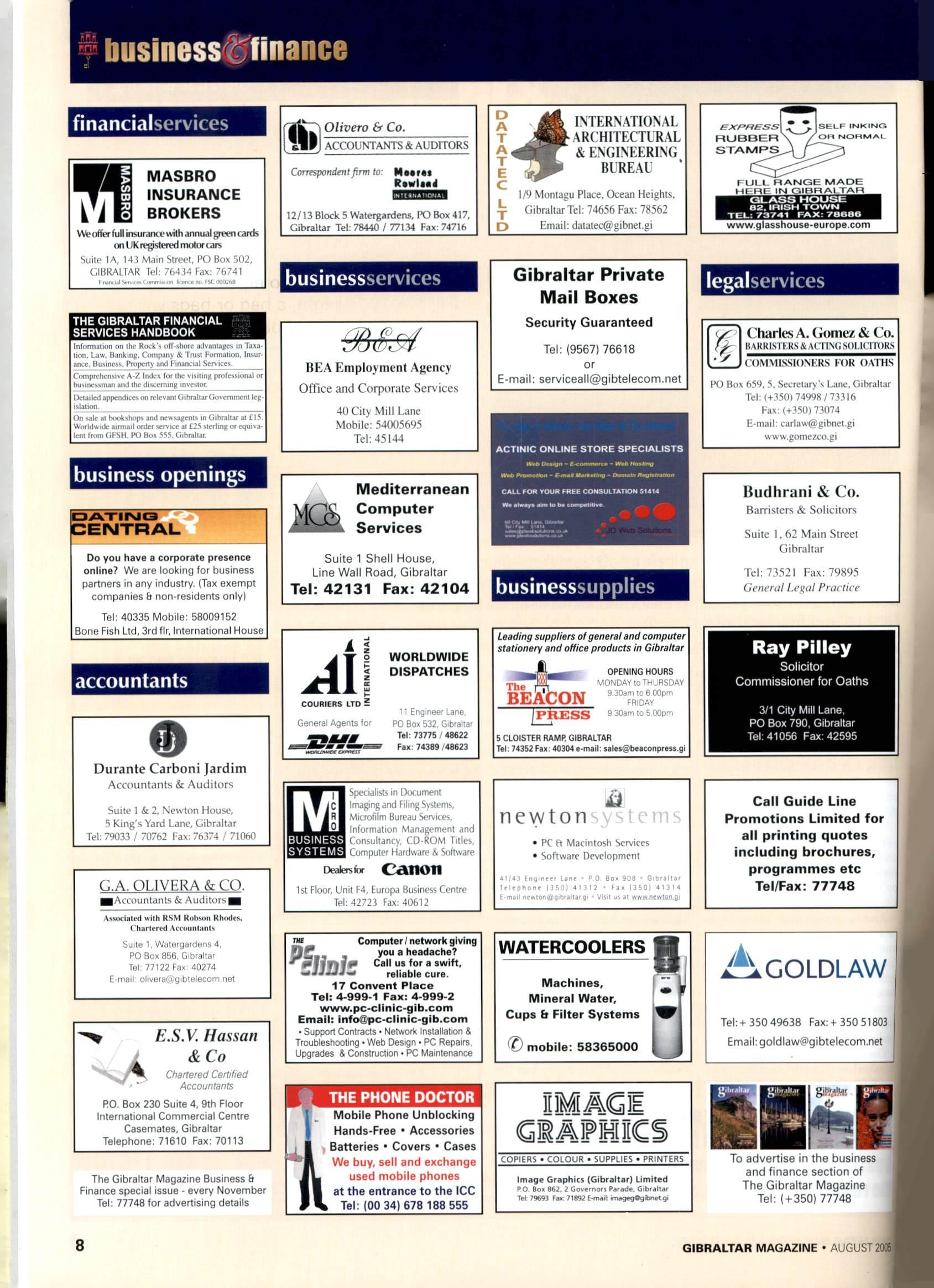
4 minute read
Congratulations Gibraltar Crystal A
In mid-July Gibraltar Crystal celebrated its 10th anniversary — a decade of providing fine glass to tourists and locals, and a decade of a genuine Gibraltar product.
Owned by Stewart and Karen Menez and Paul and Marie-Anne Montegrit'fo, Gibraltar Crystal serves clients such as banks, Rolls Royce Aeronautics and the com monwealth Broadcasting Company, to name a few. The art glass which has shown a big growth recently in one-off items, is particularly popu lar with American visitors who have it exported back home.
S(9H«sn Mmer MriK Paul Montegriffo of Gibraltar Crystal
As well as creating new glasses and other items Master Blowers Paul Alexander,Stuart Shute,Stuart Quick and Paul Lamer also carry out repairs and can make glass to order specifically to the client's specifications.
Gibraltar Crystal has proved a huge success in it's first decade... Here's to the next decade and be yond.
Though most of the main players in Gibraltar's financial services sector accept that regulation is necessary and that our Financial Services Commission (FSC) makes a better and more reasonable fist of it that many — if not all — of its peers, the grumbles that we risk becoming over-regulated remain. And, certainly, the growing plethora of EU regulations and directives - along with the increasingly complex requirements in the spheres of KYC and compliance — lend some weight to the argument.
All of which, at times, place Fi nancial Services Commissioner Marcus Killick between a rock and a hard place.He,neverthelessseems to thrive on it. And though he doesn't need a financial hack to take up the cudgels on his behalf, I find myself pointing out to the grumblers that as part of the Killick ethic the Commissioner and his team impose on themselves as high a standard or even higher standards — than they expect from the companies they licence.
Historically regulators thump the drum about "accountability" and, more recently, the new buzz-word "transparency" but they do not al ways practice what they preach. Even Killick admits this.
The Commissioner is hot on "transparency"... and "accountabil ity"... and also on "trust".
"Trust and transparency are the two qualities essential to the efficient operation of Gibraltar's financial sector," Killick wrote recently. And he stresses that if the FSC expects this from the firms it regulates it must also live up to them itself. In the process Gibraltar's FSC has be come the first regulator in the world to carry out and publish on its website a "line by line analysis" in assessing itself against the UK's Combined Code on Corporate Gov ernance — which is actually de signed for corporate companies... and not regulators.

And it also shapes the Commis sion's commitment "to take note of, and take action on"some of the recommeridations contained in the Pratt report on his review of the FSC released earlier this year.
"To some extent the founding or dinance of 1989 has been overtaken by events and there are at least four other ordinances — relating to dis closures and so on — which affect the FSC but are verging on being out of date," Killick told me recently. "We are looking to requesting the Government to consider up-dating and possibly consolidating aspects of the legislation that affect the FSC."
"But in order for Government to consider the merits of our requests we need to explain clearly what we are requesting and why...for part of the good relationship we enjoy with the Government is based on their rightful expectation that we explain to them what we consider to be the objectives and implications of our requests."
Returning to the Commission's relationship with those it regulates, Killick points out that "Trust is what develops over time, when a group of people share an understanding that the rules for behaviour govern ing their system or society work well and improve things for everyone. With trust,less effort is expended in keeping tabs on others, so systems can run more efficiently. With trust, people can develop confidence that others will,in fact,do what they say they will do. Over time, as trust builds, so does the credibility of those who are trustworthy.
"Trust underpins any successful regulatory structure. Whether it is trust of the regulator, trust of the regulatory system or, indeed trust by the regulator of those it regu lates."
And he argues that "many regu lators have fallen into the trap of adopting a confrontational ap proach with the industry they regu late. This has,in turn,created a fearbased rather than risk-based ap proach to compliance. The culture has become one of mutual mistrust and a lack of mutual respect."
Over the past two years the Com mission has changed its culture and the way it operates and has "con- sciously gone out to work with the industry in improving

"By working to create an envi ronment where firms feel we are not their opponents or at least an obsta cle to be overcome, we have found that the introduction of new regula tory standards has been met with support, not hostility," Killickwrote recently.
"This is not a case of a regulatory 'soft touch', indeed there seems to be confusion sometimes between a 'light touch' and a 'soft touch'. All our licence holders are subject to a risk-based off-site and on-site re gime. Indeed the recent reviews of us confirmed the quality ofour regu latory regime.
"Our distinction is in approach. We see partofthe role ofthe regula tor as one of stewardship. We have therefore tried to create a relation shipbased organisation, welcoming feedback on how we can improve our operation. Indeed we have set up an area on our website where comments can be put forward (anonymously if desired) and on which we have committed to pub licly respond. Our consultation documents always explain what regulatory objectives we are trying to achieve, so allowing response not merely on our proposals, but the basis on which thev are made. "











